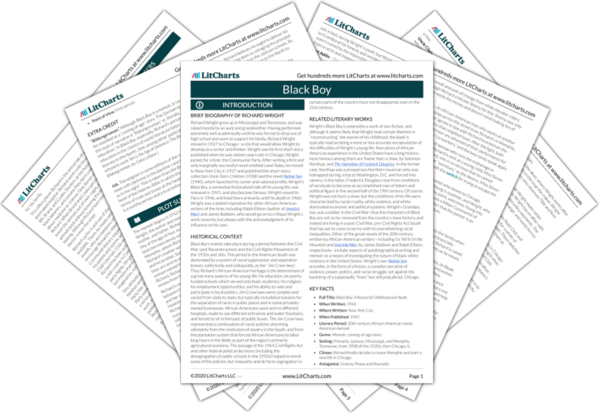Books liberate Richard; violence oppresses him. People use the switch (a rod or stick) to beat and punish Richard. Though he lives in fear of white violence, he is even more afraid of the switch, which his family uses on him. His Uncle Tom beats him for little reason, and his Aunt Addie wants to beat him after believing, wrongly, that Richard has littered her classroom with walnut shells. Granny and Richard’s mother beat Richard when he is young, fearing that he’s without religion—a “plague” in their household. Finally, Pease and Reynolds, at Crane’s shop, threaten also to beat Richard (in their case, with a piece of steel) because he has dared to learn about their trade.
The switch and other implements of violence enforce the narrow social roles Richard is forced to fill, by whites and his own family. If he violates these roles, he is punished harshly. After his escape to Chicago, Richard leaves the switch behind, though not the threat of violence. It remains a feature of Northern city life. Even at the memoir’s close, while marching in a peaceful parade, Richard is thrown aside by former comrades. For Richard, bodily harm is an obstacle to be surmounted. Free from this violence, he can continue in his project of writing and reading.
The “switch” Quotes in Black Boy
You owe a debt you can never pay.
I’m sorry.
Being sorry can’t make that kitten live again.
The next day Granny said emphatically that she knew who had ruined me, that she knew I had learned about “foul practices” from reading Ella’s books, and when I asked what “foul practices” were, my mother beat me afresh.
Why are there so many black men wearing stripes?
It’s because . . . Well, they’re harder on black people.
For weeks I wondered what it was that “uncle” had done, but I was destined never to know, not even in all the years that followed.
All right, I’ll send you home Saturday. Tell me, where did you learn those words Jody heard you say?
I looked at him and did not answer . . . . How could I have told him that I had learned to curse before I had learned to read? How could I have told him that I had been a drunkard at the age of six?
You’re just mad at me for something!
Don’t tell me I’m mad!
You’re too mad to believe anything I say.
Don’t speak to me like that!
Then how can I talk to you? You beat me for throwing walnuts on the floor! But I didn’t do it!












